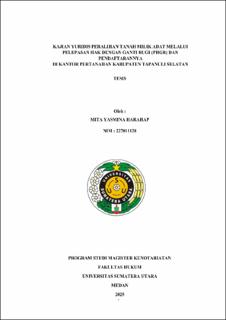| dc.description.abstract | Customary land ownership is still recognized under the Basic Agrarian Law;however, in practice, many land office process it as state land throughthe granting of the land rights. This Study addresses the following issues: (1) What is the status of unregistered land as an object of rights release with compensation (PHGR) in Pargarutan Jae, Sialagundi, and Muara Tais Villages? (2) How is the process of transferring and registering customary land through PHGR carried out? and (3) What is the role of the Tapanuli Selatan Land Office is ensuring legal certainty of land rights.
This research is a normative juridical study that refers to legal norms through a literature review to obtain secondary data in the form of primary, secondary, and tertiary legal sources relevant to the issues studied. The research is descriptive in nature. Data collection was carried out throught literaturestudy of laws and legal materials, and the data were analyzed using qualitative method.
The findings show that in Pargarutan Jae, Sialagundi, and Muara Tais community lands that have not been registered are listed as state land at the Tapanuli Selatan Office. The transfer of customary land under customary law is carried out based pn the principles of the transparency and cash payment. Customary land may be processed with a deed of sale and purchase made by a notary in accordance with Article 37 paragraph (1) of Govermant Regulation No 24 of 1997, and its registration may be conducted through conversion. However, the land office classifies the unregistered land as state land, and thus uts transfer must follow the PHGR mechanism. In this regard, the Land Office plays a role in administering land registration to provide legal assurance of land rights by implementing the PTSL program and conduting outreachon the importance of land certificates.However, this is still hindered by the low public understandingof land registration procedures and the legal benefits of land certificates. Unregistered customary land should remain classified as customary land rather than being considered state land. Therefore, there must be alignment between statutory regulations and field practices. Moreover, the registration of customary land should be sufficiently processed through the conversion of land rights. In terms of the land Office’s role in ensuring legal certainty, intiatives such as the PTSL program are important, but greater public awareness is needed. The Land Office must strengthen collaboration with village authorities and expand outreach to eliminate negative perceptions of land registration. | en_US |


